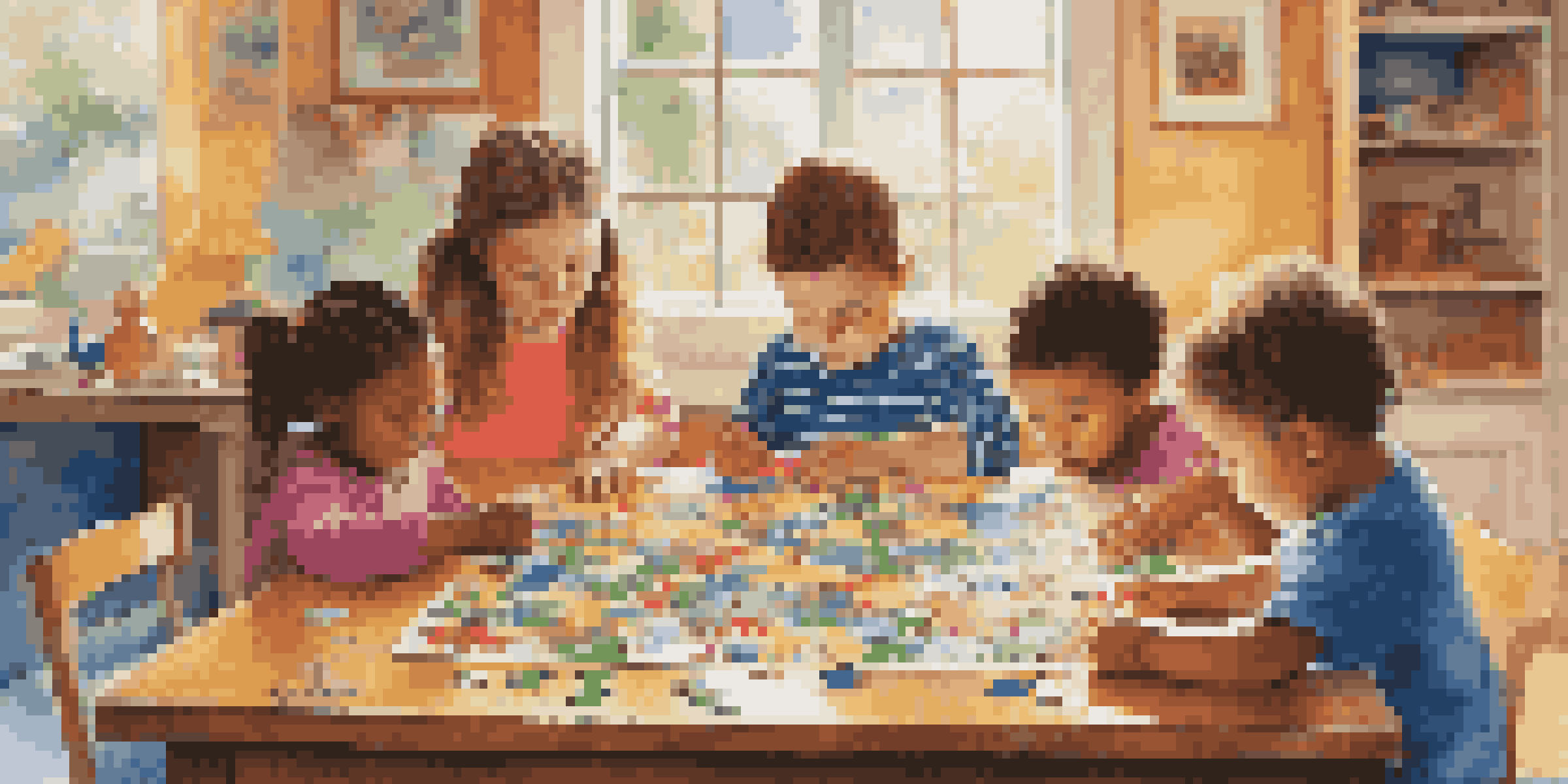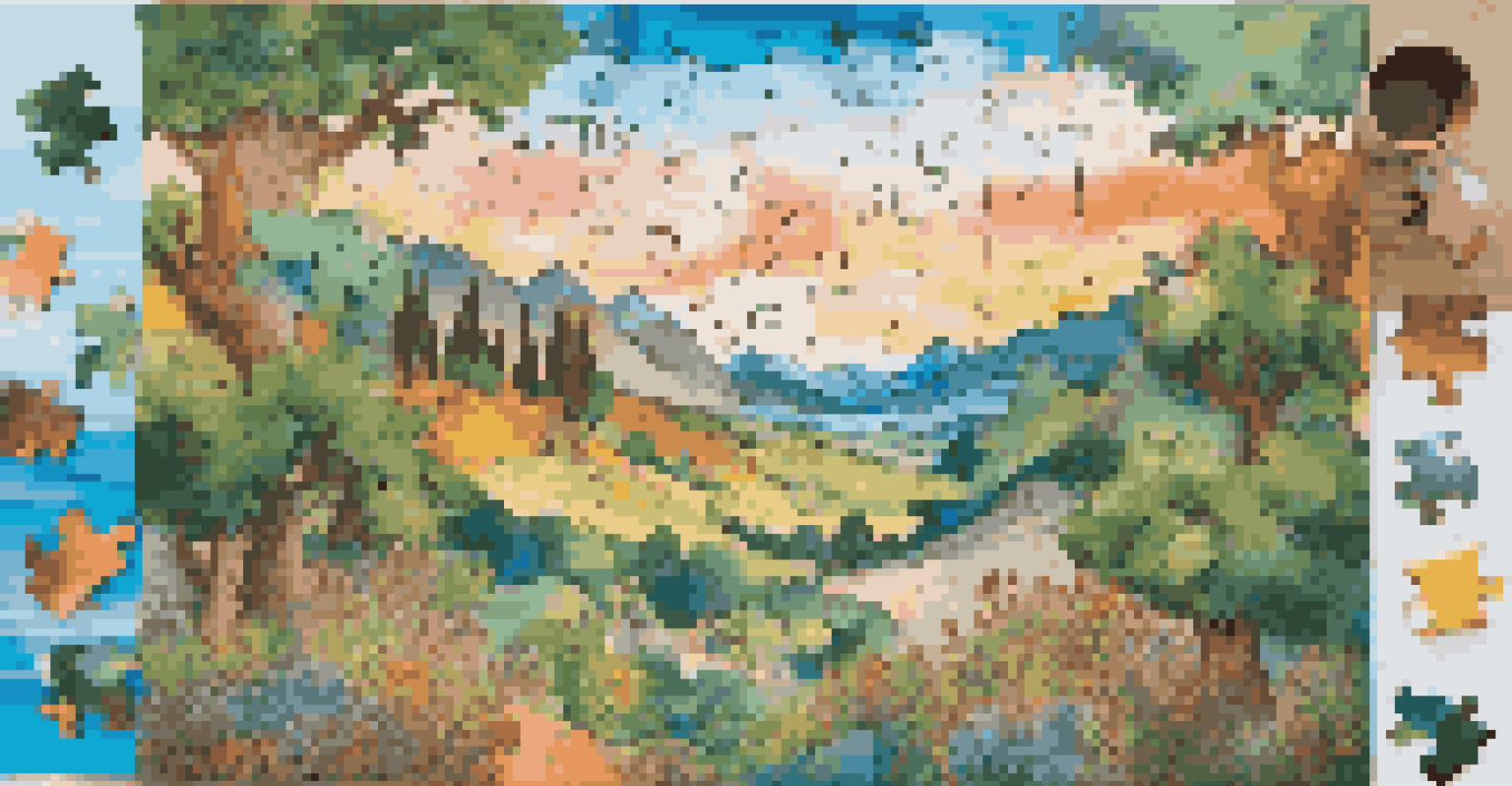The Importance of Puzzles in Early Childhood Education

Puzzles: A Fun Tool for Learning in Early Education
Puzzles serve as an engaging way for young children to learn various skills. They encourage problem-solving and critical thinking, providing a playful context for exploration. When children manipulate pieces, they begin to understand concepts of shape, size, and color, which are fundamental in early education.
Play is the highest form of research.
Through play, children are not just having fun; they're also developing important cognitive abilities. For instance, as they fit pieces together, they learn about spatial awareness and hand-eye coordination. This hands-on experience is invaluable in building a strong educational foundation.
Moreover, the satisfaction of successfully completing a puzzle boosts confidence, encouraging kids to tackle more complex challenges in the future. By incorporating puzzles into the learning environment, educators can create a dynamic and interactive space that fosters curiosity and exploration.
Enhancing Problem-Solving Skills with Puzzles
One of the most significant benefits of puzzles is their ability to enhance problem-solving skills. When faced with a challenging puzzle, children learn to think critically and develop strategies to overcome obstacles. This process mirrors real-life situations where problem-solving is essential.

As children experiment with different pieces, they learn to make decisions based on trial and error. For example, if a piece doesn't fit, they must assess why and adjust their approach. This trial-and-error method is a fundamental aspect of developing resilience and adaptability.
Puzzles Boost Cognitive Skills
Engaging with puzzles enhances critical thinking, memory, and overall cognitive development in young children.
In time, these problem-solving skills extend beyond puzzles and apply to everyday life, helping children navigate challenges with confidence. Encouraging this mindset from an early age lays the groundwork for successful learning experiences in the future.
Boosting Fine Motor Skills through Puzzle Play
Playing with puzzles is a fantastic way for children to develop fine motor skills. As they grasp and manipulate puzzle pieces, they strengthen the small muscles in their hands and fingers. This physical development is crucial for tasks such as writing and using scissors later on.
You can’t use up creativity. The more you use, the more you have.
Puzzles often require a specific grip or movement to fit pieces together, promoting dexterity and coordination. For instance, turning a piece to find the right orientation helps improve hand-eye coordination, an essential skill that supports various learning activities.
By incorporating puzzles into playtime, caregivers and educators can facilitate these important physical skills while ensuring that learning remains enjoyable. This blend of fun and development is key to engaging young learners effectively.
Fostering Social Skills through Collaborative Puzzles
Puzzles can also serve as a powerful tool for fostering social skills. When children work together to complete a puzzle, they learn to communicate, share ideas, and collaborate effectively. This interaction is vital for developing interpersonal skills that will benefit them in various settings.
As they navigate the challenges of puzzle-solving together, children practice essential social skills, such as patience and empathy. They learn to listen to each other’s suggestions and understand the value of teamwork. These experiences create a foundation for positive relationships in the future.
Fine Motor Skills Development
Manipulating puzzle pieces strengthens fine motor skills, which are essential for later tasks like writing and using scissors.
Moreover, group puzzle activities can be a fun way to introduce concepts like competition and cooperation in a controlled environment. By balancing these elements, educators can help children understand the dynamics of social interactions.
Encouraging Cognitive Development through Puzzles
Puzzles are excellent tools for encouraging cognitive development in young children. They stimulate critical thinking and memory through various types of puzzles, from jigsaw to logic puzzles. Each type challenges different cognitive skills, enhancing overall brain development.
As children piece together a puzzle, they must recall where specific pieces fit, improving their memory and concentration. This mental exercise not only sharpens their attention span but also prepares them for more complex learning tasks in school.
By introducing puzzles early on, educators can nurture a love for learning that is both fun and intellectually stimulating. This positive association with problem-solving lays the groundwork for a lifelong passion for knowledge.
Building Emotional Resilience with Puzzle Challenges
Engaging with puzzles can significantly contribute to building emotional resilience in children. Completing a challenging puzzle requires perseverance, and experiencing both success and failure helps children learn how to manage their emotions. This process is crucial for their emotional development.
When a child struggles to fit a piece, they might feel frustrated; however, overcoming that frustration leads to a sense of achievement. This cycle teaches them that persistence pays off, instilling a growth mindset that encourages them to tackle challenges head-on.
Social Skills through Collaboration
Working on puzzles together fosters communication, teamwork, and important social skills among children.
Moreover, the act of solving puzzles can serve as a calming activity, providing a safe space for children to reflect and regroup. This emotional balance is essential as they navigate the ups and downs of early childhood.
Integrating Puzzles into Everyday Learning Environments
Incorporating puzzles into everyday learning environments can enhance educational experiences significantly. Whether at home or in the classroom, puzzles can be easily integrated into various subjects, making learning fun and interactive. For instance, themed puzzles can reinforce lessons in geography or science.
Educators and parents can also create puzzle-related activities that align with their curriculum. This approach not only reinforces concepts but also keeps children engaged and motivated to learn. The versatility of puzzles allows them to be adaptable to different learning styles.

Ultimately, the goal is to create a rich learning environment where puzzles serve as an engaging bridge to new knowledge. By doing so, we can foster a love for learning that extends far beyond the classroom.